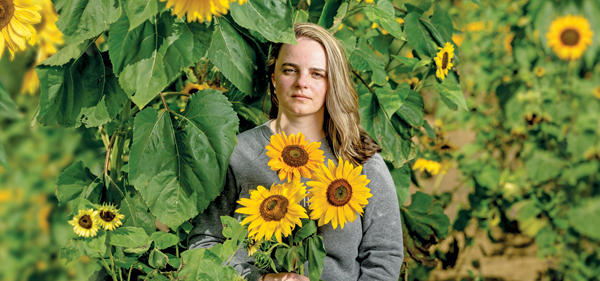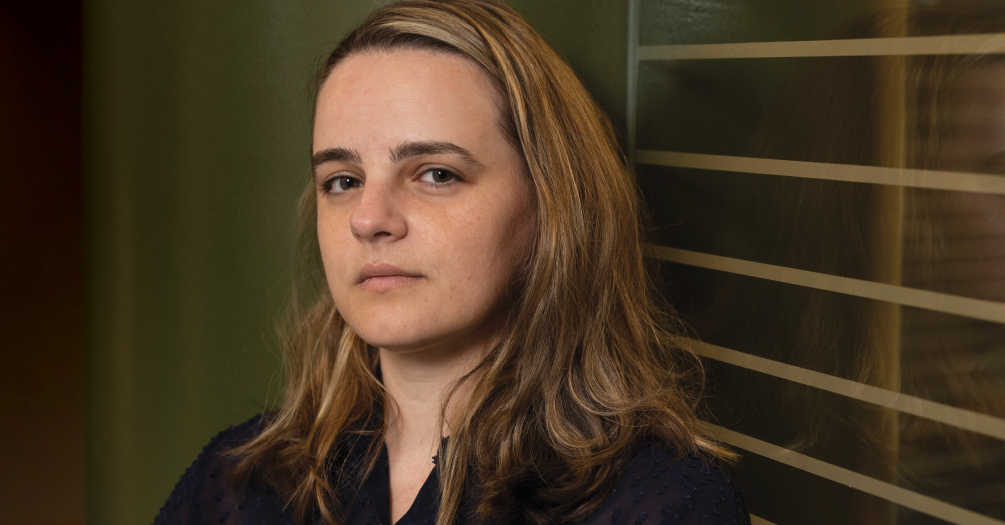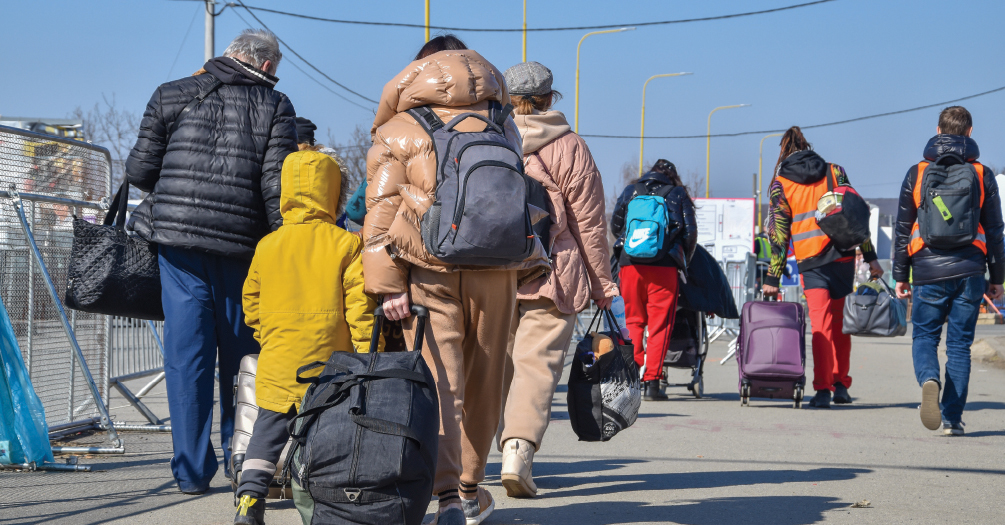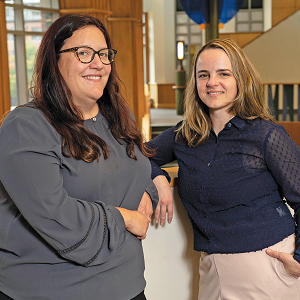Turning to public health in a crisis

Graduate student Oksana Fedorak works to prevent human trafficking in Ukraine
By Bob Cunningham
Traditionally, the sunflower is emblematic to Ukraine—but it signifies so much more to the Ukrainian people, and especially Oksana Fedorak. “Our national flower is the sunflower—it means a lot to us and me personally,” said Fedorak, a Master of Public Health student in Health Behavior and Health Education at the University of Michigan School of Public Health.
Born and raised in Ukraine, she moved to Michigan when she was 10 years old, and has a strong bond with sunflowers and her home country.
Sunflowers have been grown in the country, the seventh largest in Europe, as a cash crop since the mid-1700s. Not only are sunflowers beautiful, but they are also highly regarded for their seeds, which are crushed into cooking oil, one of Ukraine’s major exports.
More recently, sunflowers have become known worldwide as a symbol of unity, peace and resistance for Ukraine, especially since the Russian invasion began in February.
Before the invasion, Fedorak planned to travel to Ukraine for a summer internship with HealthRight International, a global health and human rights organization. Her internship was supported through the Office of Global Public Health as a Gelman Global Scholar and through the Natalie and Jack Blumenthal Internship Fund. With her homeland under attack, she couldn't travel, but she was still able to work with the organization thanks to the flexibility of her scholarships.
 From the safety of her home in Metro Detroit, she worked on a project within HealthRight
called SafeWomenHub, as she picked up one of the mantles of the Ukrainian sunflower—resistance—doing
her part to help prevent sex trafficking and human trafficking.
From the safety of her home in Metro Detroit, she worked on a project within HealthRight
called SafeWomenHub, as she picked up one of the mantles of the Ukrainian sunflower—resistance—doing
her part to help prevent sex trafficking and human trafficking.
“I’m from Ukraine and I speak Ukrainian,” said Fedorak, who grew up in Lviv in western Ukraine, about 30 miles from the Poland border. “That’s one of the reasons why I wanted to do an internship in Ukraine—because I also felt strongly about improving the public health systems there. Ukraine has a universal healthcare system, but it’s still struggling to recuperate from Soviet systems, which were very corrupt and very abusive, and it’s taking a while to really flip that over.”
Ukraine has a universal healthcare system, but it’s still struggling to recuperate from Soviet systems. - Oksana Fedorak
Before the war began, Fedorak had started talking to HealthRight in December about an internship. She met with administrators a few times over Skype and started to get into specifics of her interest in terms of mental healthcare.
“That’s something that they’re trying to really improve upon and put forward as part of their central healthcare system,” she said. “You need to have mental health care, and it’s obviously a lot more acceptable and accepted now, but in the past it was more institutionalized: If you’re not feeling OK, you’re going to an institution, and you stay there until you are better or not. They’re trying to really fix that system and move away from that Soviet model of mental health care.”
Russia invades Ukraine and Fedorak’s plans pivot
On Feb. 24, Russia invaded eastern Ukraine and all of Fedorak’s plans came to a halt, as the world focused its attention on the unprovoked attack.
All of the sudden, the internship wasn’t her first priority.
“I wasn’t thinking about whether I had an internship or not, but whether the people that I had been connecting with were OK or not— not to mention, obviously, my family and my close friends who live in Ukraine,” she said. “Honestly, the first thing that I did on my part on that day was to check in with them and make sure they were OK. I didn’t inquire about the internship until I knew everyone was safe. We kept in touch, and I think maybe in late spring we started really checking in with each other and seeing if I’d be able to help.”
Soon, her contact reached out to let her know that HealthRight got connected with a crowd-sourced Facebook group of people in mental health that might be able to help college-level students in Ukraine manage the emotional and psychological distress of the invasion.
“Like many people in much of the country, they were essentially just living with daily air raids, being bombed, and having to shelter in basements,” Fedorak said.
“In the Facebook group of psychologists, psychiatrists, neuropsychologists, and a few other specialties, they set up a Telegram channel, essentially like a mass texting social media app that has channels. The channel that we had created with that Facebook group was used for the psychological help for the students.”
At first, she got involved because she is fluent in English and Ukrainian and had mental health experience, but her robust background allowed her to be a much-needed asset.
“I did crisis stabilization and adolescent health for seven years before my current job, so I was able to help them set up a few things by putting in a few calls,” Fedorak said. “Those living conditions cause a lot of stress—to say the least—and have been going on for months now.”
“Ukraine is home to a lot of universities and hosts many international students. They have students come from India and Nigeria and from all over for the medical schools, and so they needed to ensure that students who spoke English had access to mental health help. They’re still using this group to touch base with each other, and they have prominent psychologists use it for group talks and stuff like that.”
As the war has gone on, her work and role with SafeWomenHub has evolved.
My aim is to stay in the anti-trafficking sphere until I make a dent or a huge difference—even if it takes my whole life on this earth. - Oksana Fedorak
“I’ve conducted stakeholder interviews with social media managers, social workers, psychologists and project directors and have accumulated a very large collection of notes and am still working through creating a needs assessment for the project,” Fedorak said. “It will include long-term projections for mental health care, social services and support for women and girls in general—in addition to those who have suffered from war-related, gender-based violence and increase in risk for trafficking.”
At the moment, the primary concerns SafeWomenHub platform is coping with are intense mental health crises, domestic violence, and housing and employment needs. There also have been a few cases of war-related rape by Russian soldiers reported to the platform.
“We assume this figure will rise as people find out about the SafeWomenHub platform, as more come forward, and as feelings of shame decrease,” she said.
“There are some national crises and police contacts that have likely also captured some information since they would be the ones collecting official reports of rape and war-related, gender-based violence and trafficking. Needless to say, anecdotally, I have come across some pretty horrific reports and they do exist. However, there isn’t a central place where all of this information is reported.
 “It is difficult to evaluate how many cases are being trafficked both domestically—
primarily a consequence of internal displacement—and/or internationally for those
that have gone abroad. Firstly, the nature of human trafficking is hidden and difficult
to detect and, secondly, because human trafficking is often measured in a reactionary
way by identifying victims. Therefore, we may not have an adequate assessment of the
war impact on—and, by my personal guess, increase of—trafficking of Ukrainians.”
“It is difficult to evaluate how many cases are being trafficked both domestically—
primarily a consequence of internal displacement—and/or internationally for those
that have gone abroad. Firstly, the nature of human trafficking is hidden and difficult
to detect and, secondly, because human trafficking is often measured in a reactionary
way by identifying victims. Therefore, we may not have an adequate assessment of the
war impact on—and, by my personal guess, increase of—trafficking of Ukrainians.”
There has been a push within many different organizations and platforms to provide some prevention materials, Fedorak said, but, ultimately, those numbers will only be known after the fact.
SafeWomenHub has continued to provide materials and host information sessions online through Zoom, Facebook, Instagram and Telegram to encourage women and girls to promote their range of services. As of August, organizers had made contacts with more than 250 individuals and assisted them with their needs, whether it be therapy, signing up for financial aid, or assisting them in obtaining forensic exams following sexual assault.
In addition to providing psychological support, SafeWomenHub also does a lot of preventative measures such as providing information on how to safely cross the border and awareness for essential documentation on how not to become susceptible to human trafficking.
“My plan at the moment—provided that they are on board—is to continue to stay on the HealthRight International’s SafeWomenHub project and perhaps join their Internally Displaced Persons programs and conduct additional stakeholder interviews before completing my needs assessment,” Fedorak said. “The people who are internally displaced or have survived gender-based violence, what would that look like in a year or two? What would the public health system need to have to be able to respond to this, and what programs have been implemented for gender-based violence during the war that have worked?”
Preparing for her life’s work
The Fedorak family emigrated to New York when Oksana was “around 10.” Soon after, her parents found a Ukrainian school in Warren and moved to Michigan.
Her interest in public health and preventing sex trafficking initially began in high school.
“I was focused on mostly Eastern European trafficking, and that’s kind of like what you think about trafficking when you think about people getting stolen, taken across the border, put into random, seedy hotels and that kind of stuff. But the truth of the matter is, trafficking—human trafficking and sex trafficking in particular—is a lot more psychological than that.
“I started thinking about it when I was younger, and because I’m from Ukraine, that’s why I kind of started in that area. I wanted to understand more about it and why it was happening.”
After graduating from high school, she went into her undergraduate studies “having a really big umbrella of sexual health” under consideration.
“I wasn’t specifically focusing on human trafficking or sex trafficking or gender-based violence, but I knew that it was going to be international,” Fedorak said. “I knew that it was something that I wanted to understand how various cultures approach sexual education, sexual health and sexual violence so, through that, it could develop into a variety of different things.”
She earned bachelor’s degrees in psychology and anthropology from Oakland University in 2011. She plans to graduate in the spring from Michigan Public Health and is contemplating whether to pursue a doctorate.
 Elizabeth King, associate professor of Health Behavior and Health Education at Michigan Public Health,
has been a mentor to Fedorak. King helped connect her to HealthRight International.
Elizabeth King, associate professor of Health Behavior and Health Education at Michigan Public Health,
has been a mentor to Fedorak. King helped connect her to HealthRight International.
“Oksana had the ideal set of skills for this internship because she had so much experience working on women’s health in general and women’s health in the US,” said King, who also is a faculty associate at the Center for Russian, East European and Eurasian Studies.
“She is skilled at writing grants for community-based organizations and working with NGOs, as well as having a year of public health training. Plus, she was a great match to work in Ukraine because of her language skills. This great skill set and having so much great experience on the ground in the US before coming for a Master of Public Health and then getting this additional training makes her an ideal fit at HealthRight.”
Throughout Fedorak’s time in the Health Behavior and Health Education program at Michigan Public Health, she has grown exponentially in her contextual and structural understanding of “why certain health markers are higher or lower.”
“I am continually challenged to look at more than just the end effects and figure out why the behavior leading to the end effects—like human trafficking—actually happens,” she said.
“In my internship with HealthRight International, I wanted to use this understanding and HBHE tools to find ways to assist the organization in preparing for potential future needs of the health system working with the SafeWomenHub project within the context of social services for women and girls. We had to pivot and move to a remote set-up for the duration of my internship because of Russia’s invasion, so I was intentional in not adding to the burden or stress in the organization. With that in mind, I interviewed those who are the experts of their organization—the stakeholders—those who are best equipped to truly understand what is needed.”
She spoke to many individuals in different positions of SafeWomenHub to understand what women and girls were identifying upon their first, second and further contacts. Many stakeholders themselves have used resources and were able to really outline the benefits of the services they received as well as what else they still needed.
“If there is one thing I will take away from my time in public health, it is this: More than governments or institutions, it is the people who will show you the way,” Fedorak said.
“Oksana exemplifies the promise of research-practice partnerships, ” said Fedorak's advisor, Justin Heinze, associate professor in Health Behavior and Health Education. “At Michigan Public Health, we discuss theories, methods, data collection and dissemination. Oksana cannot help but situate those discussions in her experience working with trafficked individuals, and the whens, wheres, whys and hows academic ideas translate to incredibly challenging contexts.
“By centering the community members who experienced this violence, Oksana simultaneously creates awareness of a public health emergency and applies scientific approaches incorporating public health principles like equity, participation and respect in her work to improve the lives of Michiganders and beyond.”
Fedorak is ready to dedicate her life’s work to the prevention of human trafficking. “I really don’t think there’s enough research on human trafficking in what the traffickers themselves—and I’ve been fleshing this idea out for maybe two years now—and how to essentially stop the evil that’s being done. It is very hard to do for many reasons—mostly because interviewing them would be somewhat dangerous.
“I think it’s a very important part that we’re not focusing on. It’s kind of like focusing on people who have COVID without doing research on the virus itself. That’s what it feels like to me. I think if people are really, truly serious about preventing trafficking, they really need to come to terms with the fact that they need to address the people who are doing the trafficking themselves and the systems that enable it. That means homelessness, public health access, quality care access, safe neighborhoods, sexual education … all these things are very important in really changing the atmosphere.”
Even as Fedorak has dedicated much of her time to her graduate classes and her Ukrainian internship, she has continued to be devoted as project director, grant administrator and database manager for Sanctum House, an organization in Royal Oak, Michigan, that provides long-term support for survivors of sex trafficking. She also is a board member for Supporting Impacting Giving Hope in Detroit.
